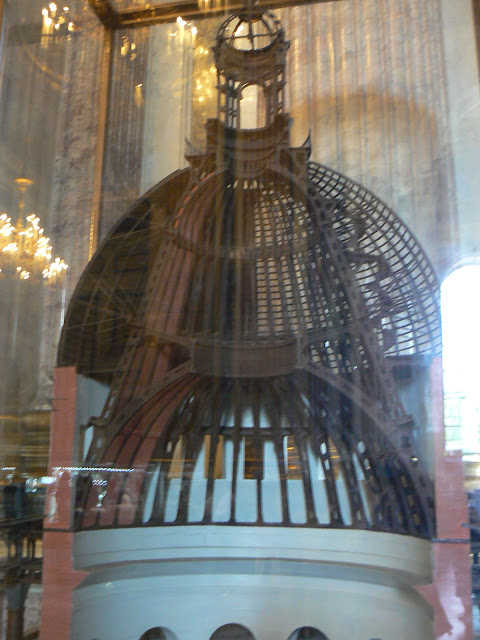St. Isaacs Cathedral
The original cathedral was the work of Antonio Rinaldi. It
was begun in 1768 and was only partially completed by 1802. Eventually in 1816,
Alexander I appointed a french architect, Auguste
Montferrand, to completely rebuild the cathedral (he was also responsible for St. Alexander’s
Column).
He designed the church in the Neoclassical style, and the somewhat plain exterior does not hint at the ostentatious and elaborate interior decoration.
St. Isaacs Cathedral (Isaakievskiy Sobor) was constructed over a period of 40 years between 1818 and 1858, and remains one of the most prominent features on the skyline of St. Petersburg.
The cathedral’s most obvious feature, the massive dome,
featured novel design techniques. Montferrand elected not to use the
traditional method of a steel-framed exterior dome supported by a masonry inner
dome. Montferrand’s system (only the 3rd example of such a
technique) consisted of 3 metal domes, with the center dome supporting the
lightweight interior and exterior metal domes. Using this system subtracted
4760 metric tons from the overall dome weight, and saved 2 million roubles.
He designed the church in the Neoclassical style, and the somewhat plain exterior does not hint at the ostentatious and elaborate interior decoration.
St. Isaacs Cathedral (Isaakievskiy Sobor) was constructed over a period of 40 years between 1818 and 1858, and remains one of the most prominent features on the skyline of St. Petersburg.
The foundation work alone took more than 5 years, in part
because a slab foundation was used in addition to the traditional wooden piles.
Another time-consuming task was obtaining the 48 granite
columns for the main portico. It took 10 years to receive all of them from
Finland, then a further 2 years to raise them to their full 51 meter height,
and 4 more years to polish them all. Additionally, each column was shaped and
finished on site using a gigantic lathe of Montferrand’s own design.
Finally, decorating the cathedral took 16 years, with the
official cathedral opening taking place on May 30th, 1858, marking
the 186th birthday of Peter the Great.











.jpg)

Comments
Post a Comment